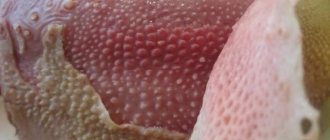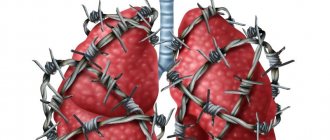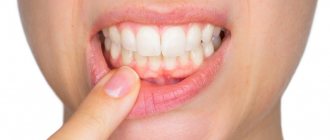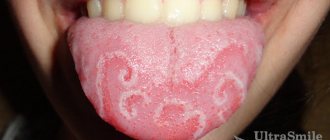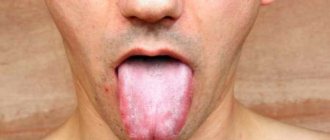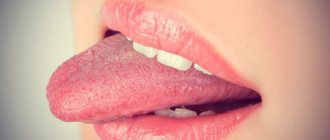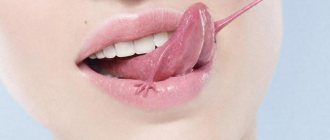Severe Tongue Biting Tongue biting and chewing is a problem that affects many people. For some, it occurs while eating, during normal daytime waking or talking, and for others it occurs at night while they are sleeping. Most often, the tip and sides of the tongue are bitten.
Although tongue biting often begins in early childhood, it may first occur in adolescents or adults, depending on the underlying cause.
If you have already searched for information on the Internet, you have found many people talking about biting their tongue and cheeks throughout their lives. We are listing a few examples to help you understand how serious this problem is. Here's what a few people say:
“How can I stop biting my tongue? I mean literally bite my tongue until it bleeds. Why am I doing this? [Ask.metafilter.com].
“I can't stop biting my tongue. I think it's due to stress or anxiety. I take the antidepressant Effexor. I've talked to my GP and dentist about this, but they don't offer any solutions. I keep thinking I might develop tongue cancer" [ourhealth.com].
Dangers of tongue biting and its signs
Some of the dangers of tongue biting include damage to the sides of the tongue, often in combination with damage to the mucous membranes of the cheeks, especially with morsicatio buccarum (Latin for "cheek irritation"). In this condition, there is chronic damage to the mucous membrane of the inner surface of the cheeks, caused by constant or periodic biting or chewing.
Tongue bleeding, soreness, sores and ulcers can also be a result of bites, especially if you suffer from the problem seriously and for a long time. It may also make it difficult to chew and eat food, as well as make sounds. Finally, clicking sounds and whistling sounds may be present during conversations in people suffering from this problem.
As to whether you can die from biting your tongue, the answer is no. Tongue bites themselves cannot cause death unless you bite off your tongue completely or cause excessive bleeding without prompt medical attention.
Medical assistance
Urgent medical attention is indicated by the condition of the lesion. You should immediately contact the dentist in the following cases:
- deep torn edges in the area of damage;
- inability to stop bleeding within 20 minutes;
- bitten through soft tissue.
When the tongue is bitten, there is numbness or severe sharp pain with any movement.
Trying to fix a critical situation on your own is dangerous. There may be a risk of infection and complications. The doctor will examine the injury, assess the condition of the injury, and provide assistance.
Accidental biting and tongue biting while eating
Sometimes someone may bite their tongue (and/or lips and inner cheek) while eating. It can also be a fluke, which is more likely to occur if you have a “disproportionately large tongue or crowded/uneven teeth” [netwellness.org]. Such tongue bites can be superficial or deep, most often not constant, but occurring from time to time.
If you bite your tongue while chewing, the resulting bleeding, pain and soreness, swelling, and the nature of the wounds and ulcers depend on the depth of the bite. In some cases, you may need emergency treatment because you are losing too much blood.
Once you have bitten your tongue, you should be careful when eating or talking afterwards for the next few days, as even a slight swelling of your tongue increases the likelihood that you will bite it again.
How to avoid biting your tongue while eating or talking
If you have a normal bite, you just need to be careful when eating. Avoid eating quickly, as well as any activities that may distract you or prevent you from concentrating on food.
However, if you have an overbite, see an orthodontist, who can recommend a variety of treatment options, both surgical and non-surgical. Such as changing the shape of the dentition, reconstruction and prosthetics of teeth.
How to get rid of the problem of biting your cheek from the inside?
The only sure way to solve such a problem is to quickly contact a professional dentist.
Options for solving the problem:
- Grind and polish the sharp edges of the teeth that touch the mucous membrane;
- Prescribe orthodontic treatment. Mouthguards for bruxism, aligners correcting minor malocclusions. The plate also allows you to reduce the clenching force of the jaws and protects the teeth from rapid abrasion (plates are installed for children under 14 years of age). Install a braces system to correct serious inaccuracies of malocclusion.
- Correction of the location of wisdom teeth or their complete removal.
- Restoration of damaged teeth, removal of old ones, reinstallation of fillings, dentures depending on their location in the jaw.
Habit of biting your tongue
Habits are things that we stick to all the time and that can be very difficult to break. For some people, persistent tongue biting is nothing more than a result of developing a tongue-biting habit. This is usually caused by anxiety, fear, stress and other emotions that cause many vivid experiences.
If you constantly bite your tongue, you may have developed an involuntary tongue-biting habit that you need to break. Effective treatment in this situation will likely require cognitive-behavioral psychotherapies as well as habit change techniques. And the help of a qualified psychotherapist can help you completely get rid of this problem.
Biting your tongue while sleeping
While tongue biting can happen accidentally while you're talking or eating, some people experience it while sleeping by biting their tongue on the side they're lying on. Sometimes, the bite can be so serious that people find blood stains on their pillow in the morning. Don't be surprised if you get tongue ulcers from biting your tongue at night.
Questions like “I keep biting my tongue in my sleep” or “why do I keep biting my tongue in my sleep” are common on the Internet. This illustrates the importance and seriousness of the problem. For example, here's what some people who have this problem say.
“I constantly bite my tongue while I sleep, and it gets worse as I sleep. This does not happen every night, but 2-3 times a week. Can you tell me what can be done about this? "[Netwellness.org]
“I bit my tongue in my sleep. My wife noticed this about a year ago, but I know it has been going on longer because I have been waking up with a very painful, swollen tongue, with deep bite marks for over two years. It really hurts and I don't know what makes me do this or how I can stop it. Everyone says it must be due to stress, but I think it's because my tongue is too big for my mouth or my teeth are at the wrong angle... Sometimes I feel so bad that it hurts to talk, and my tongue is bleeding. Can anyone suggest any solutions? " - bex200619 [netdoctor.co.uk].
It is clear that in the above messages you can see the suffering and anxiety experienced by people who bite their own tongue at night.
Reasons for biting your tongue in your sleep
Chewing your tongue while sleeping may not be a significant problem if it occurs occasionally. While you sleep, you may accidentally bite your tongue, especially if you have a disproportionately large tongue or an overbite. You would probably then bite your tongue while awake or eating.
However, what you may have is not what many people develop as a result of biting their tongue while sleeping. Biting may be caused by nighttime seizures, mobility problems, or bruxism (teeth grinding). All three of these reasons can often lead to persistent tongue biting because you may have an involuntary tongue bite when you think it is voluntary (that is, under conscious control).
Night cramps and their treatment - biting the tongue during a seizure
Tongue biting during seizures
Nighttime seizures often lead to tongue biting at night or during sleep, especially if the person develops a tonic-clonic seizure, where “the person loses consciousness and their muscles tense and twitch” [epilepsy.com].
“During my last attack, I bit my tongue. I've been experiencing pain for a couple of days now. Does anyone know a good treatment for this condition?” [Epilepsy.com].
In fact, tongue biting is often assessed by doctors as a diagnostic sign in patients suffering from seizures, which indicates possible epilepsy.
How to prevent tongue biting during seizures
If you bite your tongue while you sleep because of nighttime seizures, then you need brainwave monitoring. If you are diagnosed, you need to be treated, and this will prevent you from biting your tongue during night attacks. There are many treatments for tonic-clonic seizures. For example, a vagus nerve stimulation can help stop seizures.
Additionally, wearing a mouthguard (mouth guard) if you typically suffer from tongue biting during seizures may be helpful.
Movement disorders
The second possible reason for biting your tongue in your sleep may be movement disorders, which include sudden shaking of the head, as well as movements of the torso. They are common in children, and in severe cases can lead to tongue injuries. “These repetitive movements can cause the head to hit surfaces, body rocking, leg jerking, and rarely result in injury, including fractures, brain and eye injuries” [netwellness.org].
This problem tends to lessen and gradually disappear as the child grows, and medication may not be required. Provide your child with treatment for sleep apnea (stopping breathing during sleep) as well as cognitive behavioral therapy.
Bruxism (teeth grinding) and its treatment
If you continue to bite your tongue or cheek(s) while sleeping, it may be due to nocturnal bruxism. This is a condition in which you “grind your teeth and forcefully close your jaw. If you have bruxism, you may unconsciously clench (even crack) your teeth during the day or at night (nocturnal bruxism)” [mayoclinic.org]. Most people who have this problem also tend to bite their tongue while sleeping.
If you have nocturnal bruxism, you will clench and grind your teeth while you sleep. This may be accompanied by other sleep disturbances such as long pauses in breathing ( sleep apnea ). Snoring may also be associated with bruxism.
Treatment should be aimed at getting rid of the underlying cause, and cognitive behavioral therapy is usually recommended. This method can also help manage stress and/or anxiety, which can also cause bruxism. Contact a psychotherapist, he can help you get rid of this problem and teach you some ways to change your habit .
To relieve the stress that some women experience during pregnancy, which can also cause nighttime bruxism, try relaxing before bed by doing yoga, massage, reading, taking a bath, listening to music and practicing deep breathing. This may help reduce tongue biting during sleep.
These are the three most common reasons for biting your tongue in your sleep. Proper diagnosis and treatment, as well as methods of habit change, are necessary. In addition, mouth guards may be recommended to help stop tongue biting and tooth damage. All this will lead to you stopping biting your tongue in your sleep.
What is prohibited to do
Do not drink anything too hot or cold
If a person bites his cheek or tongue in a dream, it is important not only to properly treat the wound, but also to avoid common mistakes that can aggravate the situation. In case of injuries of this kind, it is prohibited:
- touch the bite site with dirty hands and press on it to check for pain or the presence of pus;
- treat fresh wounds with ointments, local antibiotics, iodine, brilliant green or peroxide, which can cause a burn to the mucous membrane;
- use ice-cold or extremely hot herbal infusions for rinsing;
- consume hot or cold food and drinks.
It is also dangerous to pierce the blisters on your own, which often form on the mucous membrane at the site of the bite - this is a direct path to the spread of infection, which will be much more difficult to deal with than the injury itself.
It is important to understand that frequent tongue biting during sleep, no matter how insignificant this problem may seem at first glance, is an extremely serious symptom that is dangerous to ignore. If the underlying disorder is an illness, proper treatment is needed to address the underlying cause. And patients whose pathology is caused by an unstable emotional state require the help of a psychologist, as well as independent mastery of relaxation techniques, auto-training and breathing exercises.
Similar materials
Other causes of tongue biting
To begin with, some patients infected with Lyme disease tend to have problems with tongue biting, especially in the later stages of the disease. This may be associated with “tingling of the nose, tongue (or just the tip of the tongue), cheeks, and flushing of the face” [livingwithlymedisease.org], which is possible with this disease.
Secondly, diseases leading to vitamin B-12 deficiency cause the formation of tongue ulcers, and these ulcers provoke further frequent tongue biting due to its swelling.
Blows, bruises and other injuries can cause tongue bites, especially among track and field athletes and other athletes.
Chewing tobacco causes “plaques in the mouth, which can also contribute to tongue biting” [simple-remedies.com]. Chewing gum too vigorously can also increase the chances of chewing and biting.
Finally, some tongue chewing problems are associated with side effects of certain medications, especially antidepressants.
Tongue biting in babies
The habit of biting or sucking on one's tongue, cheeks, or lips may begin to develop in younger children. They can occur in children aged 2, 3, 4, 5 or 6 months. This can be not only a habit, but also a means of relieving symptoms that are unpleasant for a child such as burning in the mouth or temporomandibular disorders.
Another possible cause of tongue biting is teething or irritation caused by a mouth or throat infection. If this is the case, give your child a toy to chew on instead of biting his tongue.
To illustrate the seriousness of this problem, here is what some mothers report:
“Lately I noticed that my baby looks like a cow chewing cud. He does this throughout the day, here and there, and he doesn't seem to experience any discomfort. I checked his gums and they don't look red or irritated." - Pandme [mothering.com]
"Help! My son (1 year 10 months) bit his tongue. He was sick, his tonsils were swollen and his throat was irritated. What medicine should I give to heal the sore on my child's tongue? - Oooicieooo [babycenter.com]
How to stop biting your tongue?
When looking at each of the possible causes of biting your tongue, we mentioned treatments or methods to get rid of the habit of biting your tongue (constant or intermittent, conscious or involuntary). In this part, we will give you some general guidelines that can further help with tongue biting.
Visit your dentist and physician to learn how you can manage this problem and learn how to use oral protection to avoid dental damage and oral injury, especially if you are active in sports.
How to prevent
Involuntary biting can be controlled with therapeutic treatment. If there are pathologies of the jaw, an individual mouthguard is made for the patient. The corrector prevents the teeth from closing tightly, protecting the soft tissues from biting.
To prevent the problem, doctors recommend:
- pay attention to your psycho-emotional state;
- eliminate nervous tension before bedtime;
- correct the bite.
Paying attention to your health will eliminate the risk of developing pathologies.
